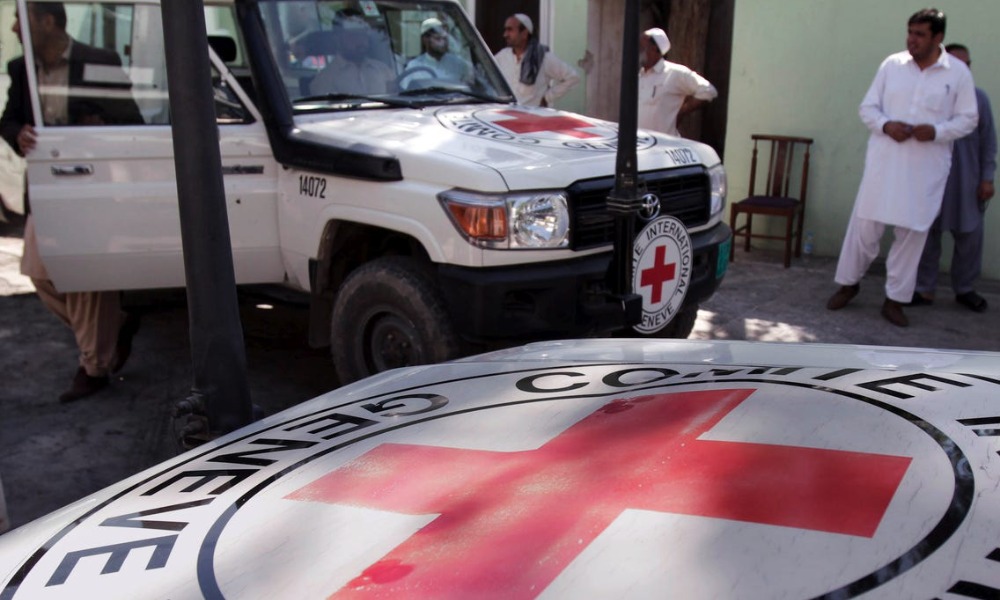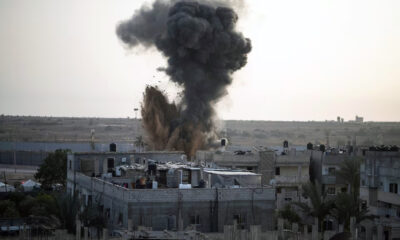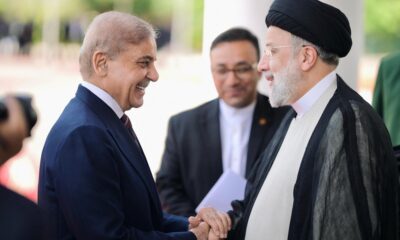Latest News
Red Cross and Red Crescent reach 35-year milestone of serving communities in need

After 35 years of humanitarian assistance in Afghanistan, the Afghan Red Crescent Society (ARCS), the International Committee of the Red Cross (ICRC) and the International Federation of Red Cross and Red Crescent Societies (IFRC) on Tuesday reconfirmed their commitment to continue jointly providing lifesaving assistance to communities affected by war and violence.
In the 35 years of joint cooperation, the movement has reconnected thousands of families separated by disasters or violence; provided vital health care particularly for communities living in remote parts of the country; clarified the fate of the dead and worked to return the remains of the deceased to their families; and restored water and shelter among other vital humanitarian activities.
ARCS has also mobilized all teams and facilities in the COVID response effort over the past year and continues its engagement, including for the COVID vaccine rollout.
In a statement issued by the movement on Wednesday, they said that ARCS is present and active in all 34 provinces in Afghanistan through a wide network of local branches, volunteers and health facilities.
Every year, ARCS reaches more than 10 percent of the Afghan population through principled humanitarian action, the statement read.
“It has built trust and acceptance across the lines of conflict and with Afghan communities they belong to. ARCS has also the privilege to belong to the Red Cross and Crescent Movement which has been standing on its side always to support its development, meet the needs of people affected by disasters and crises and contribute to build more resilient Afghan communities,” said Nilab Mobarez, the Secretary General of Afghanistan Red Crescent Society, at a news conference.
“Although the shape of conflict and violence may have changed over the last decades, our commitment to protect civilians and promote respect for international humanitarian law has been constant. We’re proud of this and honoured to continue to work with the Red Cross and Red Crescent Movement to provide humanitarian assistance,” said Juan Pedro Head of Delegation for ICRC in Afghanistan.
“In the face of protracted vulnerabilities, including to climate change, the magnitude and intensity of the needs across the country call for enhanced cooperation of Red Cross Red Crescent partners to deepen our support to ARCS’ principled and nation-wide footprint, and to maximise our collective contribution and impact,” said Pierre Kremer, Head of Delegation for IFRC.
Against the backdrop of this milestone, the movement has signed an MoU and a Movement Coordination Agreement setting out their agreement to jointly deliver humanitarian assistance.
“This event aims to ensure a partnership of quality and mutual responsibility that seeks to achieve the highest humanitarian impact. The agreement sets a standard framework for administration, reporting and accountability, within which individual projects and initiatives can take place,” the statement read.
The ICRC and ARCS have worked in partnership since 1986 in addressing the conflict related needs of the Afghan population. The ICRC and ARCS’s commitment to neutral, independent, impartial humanitarian action (NIIHA), enable both partners to respond to emergencies and provide services where others cannot.
ARCS has worked to reduce suffering for people affected by disasters, conflict and violence since its creation in 1934.
The cooperation between ARCS and the ICRC stretches back further to the recognition of ARCS as a national society by movement in 1954 continuing to the present day with adaptations based on evolving humanitarian landscape, needs of the victims and other vulnerable persons as well as the institutional development of the ARCS and the operational ambitions of the ICRC in Afghanistan.
The Federation has had a constant presence in Afghanistan since 1990, to support ARCS and its humanitarian activities.
Latest News
Afghanistan now a ‘nexus for diplomatic endeavors’, says IEA

In the wake of dozens of meetings between high-ranking Islamic Emirate officials and visiting officials from foreign countries, and other diplomatic advances, the IEA said on Thursday that in the current geopolitical landscape, Kabul now “serves as a nexus for diplomatic endeavors and political deliberations pertaining to global affairs”.
In a series of posts on X, the IEA’s spokesman Zabihullah Mujahid said diplomatic missions and political delegations from various nations, including Russia, Malaysia, Kazakhstan, Turkmenistan, the European Union, and others, “are evident in the capital, highlighting its strategic importance in fostering Islamic cooperation”.
He said: “Recently, the honorable Minister of Transport of the Islamic Emirate, Mr. Hamidullah Akhundzada, led a significant delegation to Termez, Uzbekistan, for essential discussions aimed at enhancing bilateral relations.
“These discussions encompass a wide range of topics, from trade facilitation to security assurances, indicating a focused effort by the Islamic Emirate to strengthen and broaden its international engagements, thereby ensuring sustained development and stability.
“These initiatives, characterized by diligence and effectiveness, underscore Afghanistan’s enduring commitment to diplomatic engagement and its pivotal role in regional and global affairs,” he said.
Mujahid added that these initiatives “also emphasize the vital connection between diplomatic efforts and economic prosperity, promising favorable outcomes for Afghanistan’s socio-economic landscape.”
He pointed out that despite ongoing challenges, Afghanistan “remains steadfast in its pursuit of prosperity and resilience, defying pessimistic projections and charting a course towards political and economic renewal.”
He said: “Continued efforts are essential to fostering inclusive growth and impactful initiatives, thus advancing Afghanistan’s journey towards sustainable development and increased influence on the global stage.”
Latest News
Mullah Baradar discusses creation of railway with Kazakh deputy PM

Mullah Abdul Ghani Baradar, deputy prime minister for economic affairs has met with Erik Zhumangarin, the Deputy Prime Minister of Kazakhstan, and discussed the establishment of a railway network from Kazakhstan to Pakistan through Turkmenistan and Afghanistan, the deputy PM’s office said in a statement.
During the meeting, Baradar emphasized the need to sign agreements to solve the banking problems of traders from both countries, the creation of Afghan-Kazakh joint companies, and the facilitation of visas for Afghan traders.
According to the statement, the Deputy Prime Minister of Kazakhstan said that the Kazakh government intends to establish a joint chamber of industry and commerce and a joint trade and labor group between the two countries, and is ready to cooperate with Afghanistan in the sectors of e-governance, industry, higher education, education, health, and banking.
Latest News
Iran, Pakistan leaders raise concerns over ‘terrorist groups’ in Afghanistan

Following a two-day official visit to Pakistan, Iranian President Ebrahim Raisi and Pakistan’s Prime Minister Shehbaz Sharif issued a joint statement emphasizing the need to further expand commercial and economic cooperation and transform the common border of the two countries from a “border of peace” to “border of prosperity”.
The two leaders also strongly condemned aggressions and crimes of Israel in Gaza, and demanded an immediate and unconditional ceasefire, as well as unimpeded humanitarian access to the besieged people of Gaza.
Numerous other issues were also discussed but on the topic of Afghanistan, they jointly declared their commitment to the development of Afghanistan as a peaceful, united, independent country free from the threats of terrorism and drug trafficking.
According to the statement the two countries pointed out that the existence of terrorist organizations in Afghanistan is a serious threat to the security of the region and the world.
The two sides stressed their desire to strengthen cooperation in the field of fighting terrorism and ensuring security and creating a united front against terrorism.
They also discussed the importance of coordinating regional and international efforts to ensure security and stability in the region.
“While respecting the sovereignty and territorial integrity of Afghanistan, the two sides recognized that increasing participation of all strata of Afghans in basic decision-making will lead to the strengthening of peace and stability in this country,” the statement read.
-

 Sport5 days ago
Sport5 days agoAfghanistan Champions League kicks off with grand opening ceremony
-

 Latest News4 days ago
Latest News4 days agoPakistan’s frontiers minister stresses ‘dignified’ return of Afghan refugees
-

 Latest News5 days ago
Latest News5 days agoMore than 800 Afghan refugees deported from Pakistan in two days
-

 Regional3 days ago
Regional3 days agoIranian president lands in Pakistan for three-day visit to mend ties
-

 Climate Change4 days ago
Climate Change4 days agoMassive river flooding expected in China, threatening millions
-

 Latest News4 days ago
Latest News4 days agoChinese keen to invest in Panjshir-Kabul water conduit project
-

 World4 days ago
World4 days agoTwo Japan navy helicopters crash, one body found, 7 missing
-

 Sport3 days ago
Sport3 days agoKolkata beat Bengaluru by one run in IPL as Kohli fumes at dismissal
























